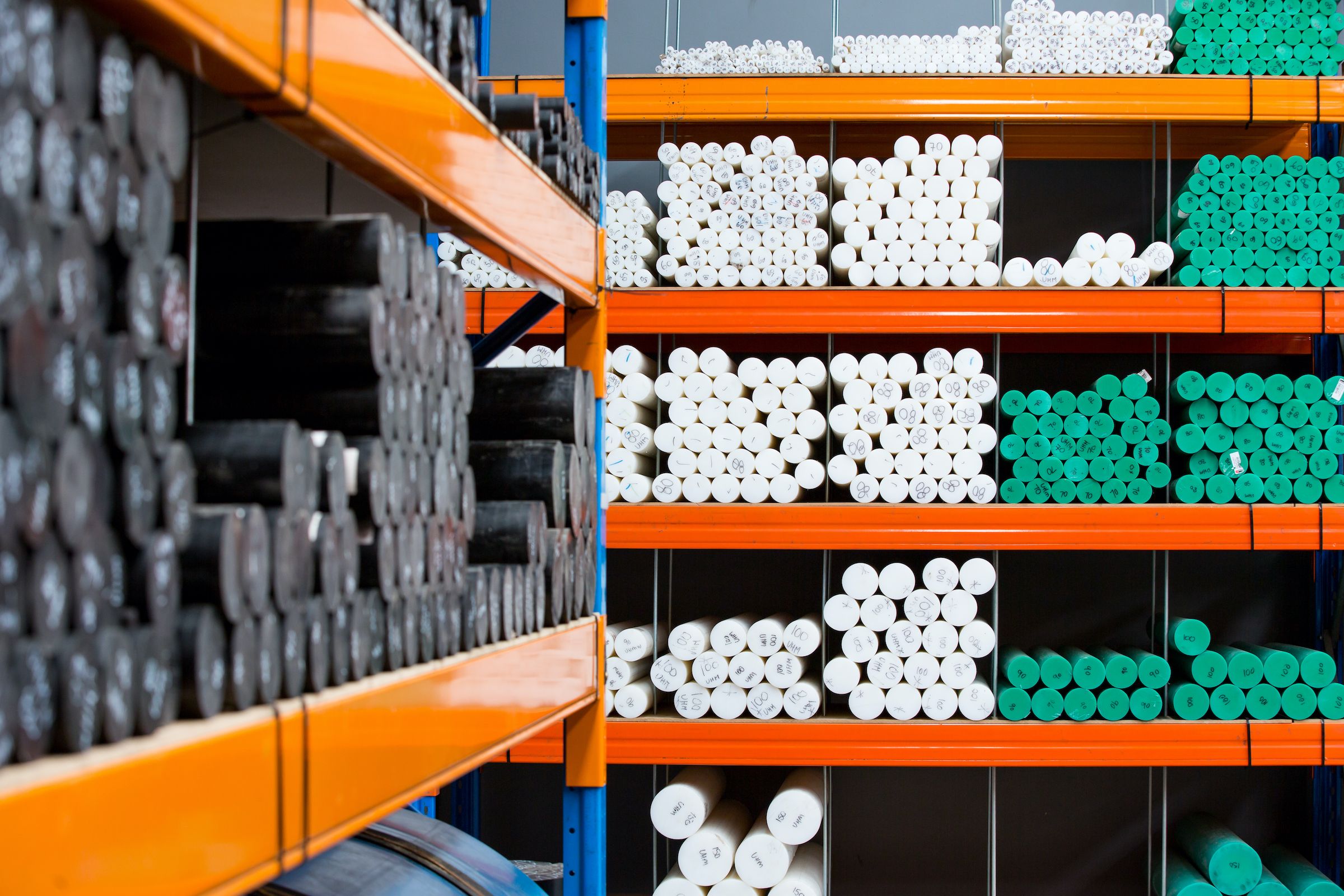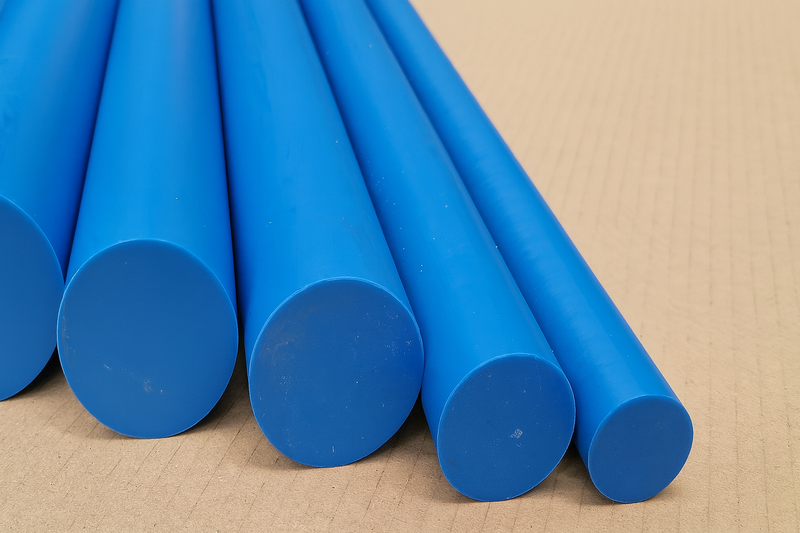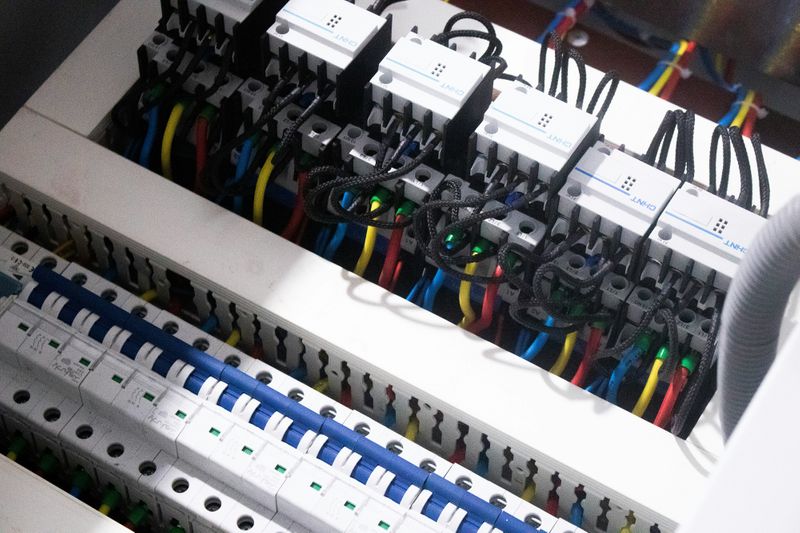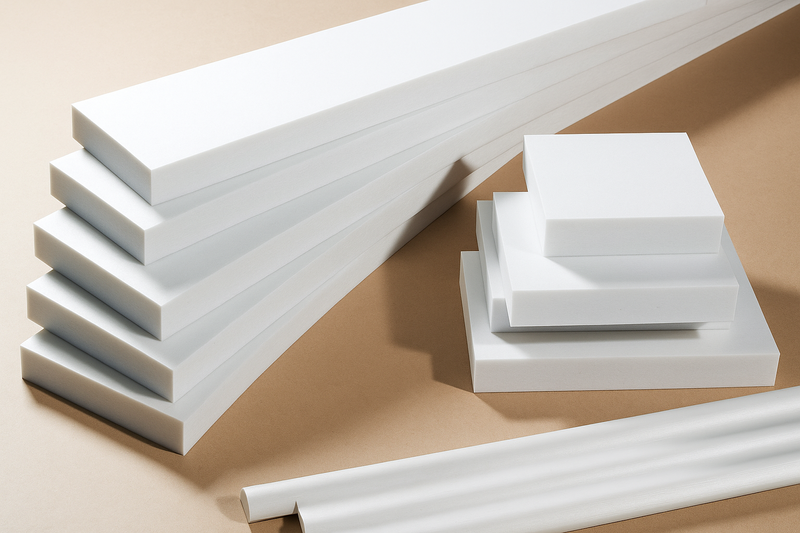At a glance
- Superior wear resistance and high impact strength for challenging environments.
- FDA compliance, ensuring safety and hygiene in food contact applications.
- Non-toxic and non-hazardous nature, ideal for medical and food-related sectors.
Ultra-high molecular weight polyethylene (UHMWPE), particularly the premium class developed by Okulen®, is a powerhouse material in a variety of demanding industrial environments. Known for its remarkable properties, including resistance to abrasion, chemical attacks, and water absorption, UHMWPE is an engineering favourite. Despite its extensive list of benefits, it's important to note that UHMWPE is not suitable for high-temperature applications.
This detailed examination explores the unique characteristics, applications, and frequently asked questions about UHMWPE.
Unmatched Durability and Performance
Okulen®’s UHMWPE is celebrated for its excellent wear resistance and high impact strength, making it an ideal choice for high-stress applications. Its durability is a critical feature in industries that demand robust materials capable of withstanding rough conditions without degradation. The material's low friction coefficient enhances its utility by providing exceptional sliding properties, which are essential for components like chute liners and conveyor systems.
Versatility Across Industries
UHMWPE is extensively used in a myriad of sectors due to its versatile properties. In the food processing industry, it is utilised for manufacturing components such as bearings, gears, and chute liners. These applications benefit from the material’s FDA compliance, ensuring safety and hygiene in food contact applications. In material handling and packaging, UHMWPE is chosen for anti-static chute liners and wear strips, improving the longevity and efficiency of the equipment.
Conveyor systems
Conveyor systems, integral to numerous industrial operations, rely on UHMWPE for wear strips, gears, and chain guides, capitalising on its low friction and excellent abrasion resistance. The marine industry employs UHMWPE to construct covers, doors, and other fixtures that require resistance to moisture and wear. Furthermore, wastewater treatment facilities utilise this material for its durability and chemical resistance, making it suitable for wear strips, paddles, and scraper blades.
Textile Machinery
Textile machinery represents one of the earliest and most extensive uses of UHMWPE. On average, each piece of textile machinery utilises around 30 UHMWPE parts. These components range from shuttles, rods, gears, and couplings to more specialised parts like buffer blocks and eccentric wheels. The wear parts made from UHMWPE GB offer enhanced durability and reduced maintenance needs, which are crucial for the high-demand cycles of textile production.
Papermaking Machinery
In the papermaking industry, UHMWPE is used extensively, accounting for about 10% of its total industrial application. It is used to manufacture critical components such as wipers, suction box covers, deflectors, and scrapers. UHMWPE's excellent wear resistance and reduced friction contribute to smoother operations and prolonged equipment lifespan, which are vital in the continuous operation environments of paper mills.
Packaging Machinery
UHMWPE GB finds significant application in packaging machinery, where it replaces modified fluoroplastics for parts like guide rails, slider seats, and fixed plates. These UHMWPE components ensure reliable and efficient machinery operation thanks to their high wear resistance and non-stick properties, reducing downtime and enhancing productivity.
General Machinery
In broader industrial applications, UHMWPE GB is utilised to make a variety of machine parts, including gears, cams, rollers, and bearings. Its application also extends to protective structures like dock and bridge pier plates, showcasing its capacity to withstand harsh environments and heavy loads.
Environmental and Health Safety
A significant advantage of UHMWPE is its environmental and health safety profile. It is non-toxic and non-hazardous, making it a preferable choice in medical and food-related applications. Furthermore, its recyclability aligns with current global efforts to reduce industrial waste and promote sustainable manufacturing practices. The material’s non-stick nature, coupled with its excellent sliding ability, also makes it ideal for applications requiring clean and efficient movement of materials, such as the inner linings of trucks and containers.
Revolutionising Food Production
In the food production industry, engineering plastics are crucial due to their resistance to wear, low maintenance, and hygienic properties. These plastics are used to manufacture components that come into direct contact with food products, thus ensuring safety and compliance with health regulations. For instance, conveyor belts, gears, and guards made from engineering plastics are commonly found in food processing plants throughout Southern NSW, helping to streamline operations and maintain high hygiene standards.
Innovating Niche Products for Food Industries
The development of niche products for specialised food sectors, such as organic and vegan food production, also relies heavily on engineering plastics. These materials are selected for their ability to be easily cleaned and sterilised, preventing cross-contamination and supporting the integrity of these sensitive products. Additionally, the versatility of engineering plastics allows for custom part designs that meet the specific needs of these niche markets, enhancing the efficiency of specialised machinery.
Enhancing Food Machinery Manufacturing
In regions like Shepparton and Goulburn, where food machinery manufacturing is a significant industry, engineering plastics are valued for their mechanical properties and cost-effectiveness. Components such as valves, bushings, and nozzles made from these plastics not only reduce the overall weight of the machinery but also offer excellent wear resistance and reduce lubrication requirements, leading to lower maintenance costs and extended equipment lifespan.
Supporting Wine Bottling and Beverage Processing
The wine bottling and beverage processing industries benefit greatly from the application of engineering plastics, particularly in terms of improving the longevity and reliability of bottling and packaging lines. Engineering plastics are used to create parts that withstand the acidic environments found in wine bottling, as well as the high-speed operations of beverage processing lines. This ensures a smoother, faster production process and minimises the risk of mechanical failures that can cause costly downtime.
Streamlining Canning Operations
In the canning industry, the harsh conditions of high temperatures and exposure to various liquids make engineering plastics invaluable. These plastics are used to produce components that are resistant to corrosion and wear, such as seals and gaskets, which are critical for maintaining the integrity and safety of canned goods. The durability of engineering plastics ensures that canning facilities in the Murray Valley and beyond can operate efficiently and continuously without frequent stoppages for maintenance.
UHMWPE by Okulen® stands out as an engineering plastic with unmatched versatility and performance. Its application across various industries—from food processing to marine and wastewater treatment—demonstrates its adaptability and capability to meet diverse operational demands. As industries continue to evolve, the role of materials like UHMWPE becomes increasingly significant, driving innovations and ensuring efficiency and sustainability in production processes.
For those interested in leveraging the benefits of UHMWPE for their operations or becoming a trade customer with access to competitive pricing, please contact us at 1800 215 216 or visit our website for more information and guidance. This exploration into the capabilities of UHMWPE highlights its importance as a cornerstone material in the engineering plastics landscape, promising ongoing benefits and advancements for a wide range of industrial applications.
Frequently Asked Questions
Is UHMWPE strong?
Yes, UHMWPE is exceptionally tough and boasts high-impact strength, making it resilient in various challenging applications.
Is UHMWPE non-stick?
Absolutely, its non-stick properties and superior sliding ability make it perfect for applications where material flow is critical, such as liners and slides.
Is UHMWPE toxic?
No, UHMWPE is non-toxic and safe for use in sensitive applications, including those in the medical and food sectors.
Does UHMWPE absorb water?
UHMWPE does not absorb water, which is vital for applications exposed to moisture. This enhances its longevity and performance consistency.








